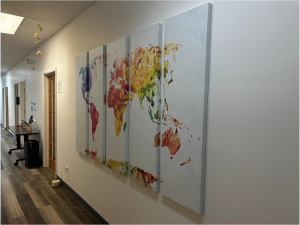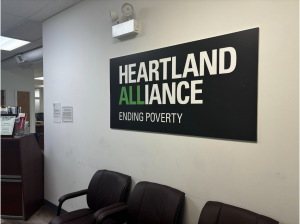 We often hear the phrase “don’t make excuses, make improvements”. For many, this may be a difficult thing to be told – this kind of statement misses and overlooks the individual nuances and circumstances of the situation we find ourselves in. But despite these challenges, we now find ourselves forced to continue on with no acknowledgement of them.
We often hear the phrase “don’t make excuses, make improvements”. For many, this may be a difficult thing to be told – this kind of statement misses and overlooks the individual nuances and circumstances of the situation we find ourselves in. But despite these challenges, we now find ourselves forced to continue on with no acknowledgement of them.
Although I was not aware that I could have a new perspective on this idea, my time so far working in refugee and immigrant resettlement at Heartland Alliance has brought me one. But before I analyze that piece further, I want to take you through my time so far as an intern on the employment team.
As I onboarded remotely during my first week, rather than being assigned training to do on the side, I was immediately put on meaningful tasks: calling refugees and immigrants involved with Heartland’s programs (referred to as “participants” from hereon). I spoke with them about their work history, goals, and made resumes for them. Of course, not only was it my first week on the job, but I also had never spoken at length with a newly arrived refugee. I also had never made a resume for someone other than myself. I was briefed about what to expect, but my learning of this process was to come through the performing of the tasks, and through the mistakes I would make with real-life participants.
I had no choice but to find “improvements”, or what would be in this case, solutions.
When I arrived in Chicago, IL to begin my in-person work, I encountered many of the same experiences. In addition to making more calls, I was assigned to take groups of participants to group job interviews at employers around the city on public transportation. Not only was I navigating new parts of Chicago for the first time, but I was also navigating the challenges of making sure every participant was prepared both logistically, physically, and even emotionally for the interviews. I was extremely nervous to carry out these trips. But I had no choice. The participants were expecting to go to their interviews, and the employers were expecting me to arrive. I had to find solutions.
But possibly the most profound moment came on my first day in the office. Upon my arrival, I sat down to shadow and observe a meeting between my supervisor and a participant to resolve a miscommunication. The conversation was being facilitated by an interpreter (although the participant had a basic level of English). The participant was expressing some frustrations and challenges (ones outside of Heartland’s jurisdiction) that he was facing in his first few months in the US, understandably asking for sympathy and for Heartland to fix them.
My supervisor told the participant firmly, but with care, that she herself was an immigrant to the United States several years ago too, telling him that “When you are an immigrant, excuses do not help you, because no one else cares. Immigrants cannot make excuses. We can only find solutions”. Although it may seem insensitive to some, at that moment my supervisor had only one goal – to ensure that the participant in front of her obtained a job and kept a roof over his and his family’s head at all costs. She expressed to him that he had no time to think about which parties were to blame for each problem in the past. He only had time to think about the solutions.
Not only do the folks who work at Heartland have to come up with solutions on a day-to-day basis in our work, but the participants must do the same thing. Only for them the consequences do not simply pertain to their job, but rather their entire lives. Throughout my first month working here, I have realized that it is a privilege to have the time and bandwidth to distribute blame and air grievances in other areas of work and life. Some people do not get such a luxury.
 When I take a step back now and consider Heartland’s broader role in its community, it falls in some sense along the lines of this exact idea, providing solutions in all kinds of forms in housing, employment assistance, vocational English language training and even trauma assistance. The team here can only think in these terms (solutions, that is); when people’s livelihoods depend on you, you have no choice.
When I take a step back now and consider Heartland’s broader role in its community, it falls in some sense along the lines of this exact idea, providing solutions in all kinds of forms in housing, employment assistance, vocational English language training and even trauma assistance. The team here can only think in these terms (solutions, that is); when people’s livelihoods depend on you, you have no choice.
So the next time you come across a challenge in your workplace or life and look to blame someone else, be mindful of your relative position of privilege: there are others in the world who cannot afford to do that. Sometimes it may be beneficial and correct to assess blame for such a challenge. But other times, it might just be better to find a solution.
- by Aidan Obermueller, Heartland Alliance